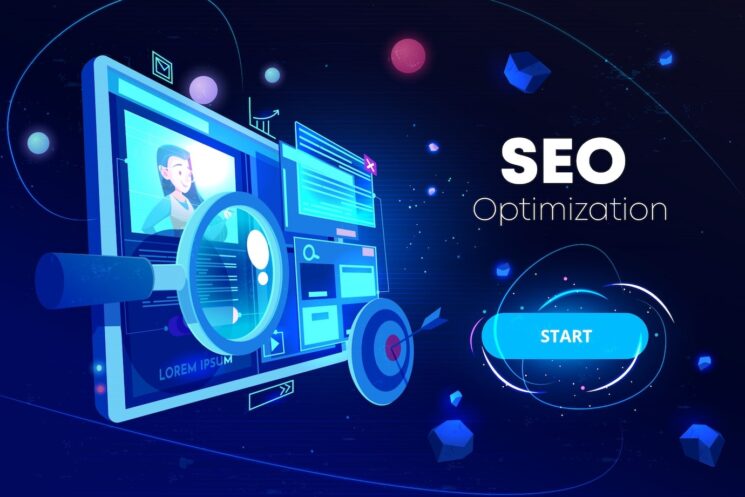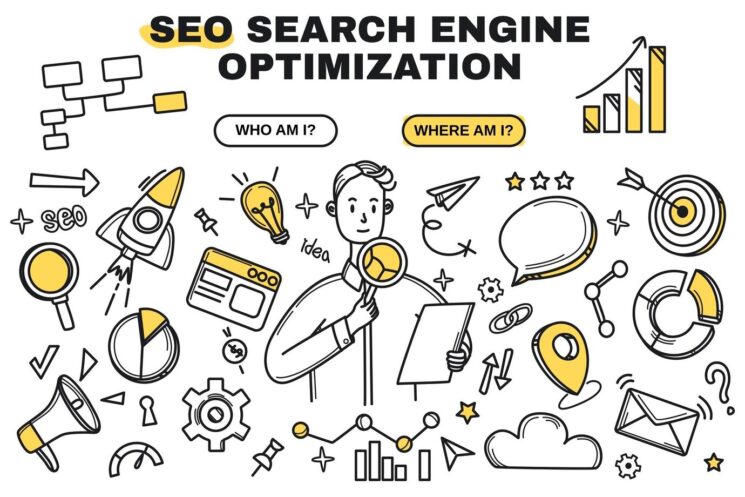Welcome to the world of virtual expansion where your digital presence holds the key to your success. If you are a beginner in website management, learning about search engine optimization (SEO) is paramount.
No matter how attractive or well-designed your website might be, without proper SEO, pursuing online growth can turn into a challenging endeavor.
In This Post
1. What is SEO?

SEO or Search Engine Optimization involves utilizing various techniques and strategies that help your website rank higher on search engines like Google, Bing, and Yahoo.
The realm of SEO consists of different aspects including keyword optimization, SEO-friendly content, and much more. To put it simply, SEO gives your website the power to speak the language that search engines understand easily.
Importance of SEO for website beginners
For newcomers, understanding and implementing SEO strategies can seem daunting. But worry not! With a strategic approach and persistence, SEO will prove to be your strongest ally in boosting your website ranking and visibility.
- SEO increases organic traffic: Higher rankings on search engine result pages translate to more visibility and consequently, increased organic traffic.
- SEO establishes brand credibility: Ranking on the first page of Google helps in building trust and credibility with your audience.
- SEO provides invaluable insights: SEO tools like Google Analytics provide data and metrics that can reveal important information about your website’s performance and visitor preferences.
Stay tuned for our top 10 crucial SEO tips that will help you strengthen your online presence like a pro!
2. Understanding Keywords
When it comes to SEO, one can’t underestimate the prominence of keywords. They are the backbone of your SEO strategy, acting as the bridge that connects user search queries to your website content.
Importance of Keyword Research
Keyword research is an essential first step in optimizing your website for search engines. It involves identifying popular words and phrases people enter into search engines that are closely aligned with the content, products, or services you offer.
- It helps you understand what topics your target audience is interested in.
- It guides you to create content that meets your audience’s needs.
- It enables you to forecast changes in market demand and stay ahead of competitors.
Choosing the Right Keywords for Your Website
Identifying relevant keywords is crucial, but equally important is selecting the right keywords for your website- these can vary depending on your business niche, offerings, and target audience. Here are a few pointers:
- Use long-tail keywords: These are more specific and less competitive.
- Consider user intent: This means understanding what users are looking for when they enter particular keywords.
- Make use of keyword research tools: Tools like Google Keyword Planner or SEMRush can provide insights into search volume, competition, and keyword relevancy.
Remember, SEO isn’t a one-time action; it’s an ongoing process. Constantly refining and updating your keyword strategy is integral to improving your website ranking.
3. On-Page Optimization

On-Page Optimization involves refining various parts of your website that affect your search engine rankings. It’s something you have control over and can modify on your own website.
Creating SEO-friendly URLs
First and foremost, make sure your URLs are SEO-friendly. This means they should be easy for search engines to find and understand. Short, descriptive URLs are favored by search engines and users alike. Try to include your target keywords into your URLs, and avoid confusing strings of numbers and letters. An example of a good URL might be www.yourwebsite.com/seo-tips-for-beginners.
Optimizing title tags and meta descriptions
Next, you should focus on optimizing your title tags and meta descriptions. This is the text that Search Engine Results Pages (SERPs) display for your website. A compelling, keyword-rich title tag and meta description will not only help search engines understand what your page is about but also encourages users to click on your page in the SERPs.
Using header tags effectively
Header tags or HTML tags (H1-H6) help to identify the headers and subheaders of your content. They give your content a hierarchical order and make it easier for users to navigate your site. Be sure to incorporate your main keywords into your H1 tags, and use and tags for subheadings.
Optimizing website content with targeted keywords
Lastly, content is king in the realm of SEO. To optimize your website content with targeted keywords, naturally incorporate them into your blog posts, articles, product descriptions, and other site content. Strike a balance between readability for users and keyword density for search engines:
- Don’t overstuff your content with keywords, which can lead to a penalty from search engines.
- Use synonyms and related terms to your target keywords.
- Long-tail keywords can be especially beneficial for website beginners.
These on-page SEO techniques are essential to the success of your website optimization strategies. As a website beginner, understanding and implementing these techniques can significantly improve your website ranking.
4. Off-Page Optimization

Off-page optimization plays a significant role in your website’s ability to rank. Two essential aspects of off-page SEO are building quality backlinks and utilizing social media platforms for SEO purposes.
Utilizing Social Media for SEO
Social media is not just for networking; it’s a powerful tool for boosting your SEO. Search engines recognize the relationship between your website and its social media profiles, evaluating interactions and shares your pages receive. So, take your SEO game to the next level by:
- Regularly posting engaging content on your social channels to stimulate shares.
- Adding social sharing buttons on your website’s blog posts.
- Interacting with followers by responding to comments and mentions.
Remember, SEO extends beyond just your website, requiring consistent effort across multiple platforms. So, keep these tips in your mind as you carve your digital niche.
5. Site Speed and Mobile Optimization
Before we start diving into more complex SEO tips, let’s begin with something basic but equally important – your website’s speed and its mobile compatibility. These are two influential factors in terms of your site’s SEO performance.
Importance of Site Speed for SEO
Site speed is how fast your website loads when someone clicks on it from search results. The truth is, if your site takes more time than expected, the potential visitor might get frustrated and leave, increasing your bounce rate.
Google considers this rate while determining your site’s ranking. A faster loading site also ensures a better user experience, which indirectly improves your SEO. Some ways to increase your site speed are:
- Optimize your website images
- Leverage browser caching
- Reduce server response time
Optimizing Website for Mobile Devices
Mobile optimization is tailoring your site to perform well on mobile devices. Over half of all internet traffic now comes from mobile phones. So, if your website isn’t mobile-optimized, you’re missing out on a significant portion of the Internet audience.
Plus, Google has switched to mobile-first indexing, meaning it predominantly uses the mobile version of your content for indexing and ranking. Here are a few tips to optimize your site for mobile:
- Ensure your website layout is responsive, adapting to various screen sizes
- Make sure text is readable without zooming
- Avoid using Flash as it’s not commonly supported on mobiles.
6. User Experience and Design

When it comes to SEO, one thing that many website beginners overlook is the importance of user experience and design. Believe it or not, they have a significant impact on your SEO performance.
Importance of User-friendly Website Design
For starters, creating a user-friendly website design is not only essential for enhancing the user experience but also for improving SEO. Websites that are easy to navigate, visually appealing, and informative are more likely to retain visitors. Over time, this contributes to lower bounce rates and higher search engine ranking. Keep in mind:
- Neat and clean website design
- Easy-to-read text
- Attractive visuals, preferably original instead of stock photos
- Minimum use of pop-ups to prevent distraction
Improving Website Navigation
Just like an efficiently arranged supermarket, your website should guide visitors seamlessly through different sections. You can improve this by:
- Incorporating a simple, uncluttered navigation bar
- Adding a search function for easy access to information
- Using breadcrumb navigation for multi-page websites
Implementing Responsive Design
Today’s digital world screams mobility and your website isn’t exempted. Implementing a responsive design that looks excellent and functions well on all devices, especially mobiles, is a must-do. This is not only favored by users but also by search engines.
Google, for example, ranks mobile-friendly sites higher, a strategy known as mobile-first indexing. This illustrates just how much user experience and design matter in SEO, making them critical elements to consider for website beginners.
7. Content Creation and Optimization

Quality matters a lot when it comes to content. You can have all the SEO optimization in the world, but if your content lacks substance, all your efforts will be in vain. Remember, ‘Content is King.’
Creating High-Quality, Unique Content
The first step is to create valuable, unique content that provides information, solves a problem or offers something not available elsewhere. Google loves fresh, original content. It not only helps to position your website as a relevant and trustworthy source of information but also encourages visitors to stay longer and explore more on your site.
Optimizing Content with Keywords
Next, you need to incorporate search engine friendly keywords throughout your content. Avoid keyword stuffing, maintain a natural tone.
- Include your primary keyword in the title, headings, and meta description.
- Keep keyword density around 1-2%.
- Also, don’t forget to include related keywords (LSI keywords).
Utilizing Relevant Images and Videos
Finally, supplement your text with relevant images and videos. If you’re using stock photos, make sure they are high quality. Always include ‘alt text’ for images, with relevant keywords to enhance SEO. Videos should have descriptions and hashtags for better visibility. This not only increases user engagement but also improves your website’s ranking in Google’s search results.
8. Monitoring and Analyzing
As a beginner in SEO you may not realize it initially, but monitoring and analyzing your website’s SEO performance is a crucial step to improving your website’s ranking. Gathering data isn’t just interesting – it’s essential for making informed decisions about changes and adjustments for your site.
Implementing Google Analytics
One of the most vital SEO tips for beginners involves utilizing Google Analytics. This tool allows you to track your website’s traffic, user behavior, and even the effectiveness of your keywords. It can show you which pages of your site are getting the most visitors and where those visitors are coming from.
- To get started with Google Analytics, simply integrate it into your website and spend some time exploring its features.
- The standard reports can help identify trends and potential issues that need to be adjusted.
Tracking Website Performance
The next SEO tip for beginners is to keep an eye on website performance. Things like load times and mobile compatibility can manifest as SEO issues, affecting your site’s ranking in search engine results.
Tools such as Google’s PageSpeed Insights can give insights into load times and opportunities for speed improvement.
Making Data-Driven Decisions
Finally, use all the data you gather to make decisions about your site. If a certain post isn’t attracting the traffic you were expecting, analyze the reasons why and make the necessary adjustments. Similarly, if a keyword isn’t yielding the results you hoped for, consider tweaking it.
Remember that the world of SEO is constantly changing, so it’s important to analyze your performance regularly and make data-informed changes as needed.
In conclusion, monitoring and analyzing your site’s performance is an ongoing task but it’s one that’s essential for improving your SEO.
9. Local SEO

SEO isn’t just a global game; it’s also local! Local SEO involves optimizing your website for a specific geographic location. This is especially important if you’re running a small business that relies on foot traffic or providing services in a particular area.
Importance of Local SEO for Small Businesses
Local SEO helps your business gain visibility in your community and surrounding areas. When your website is optimized for local SEO:
- Your business appears in “Near Me” searches.
- It helps establish your brand’s local online presence.
- You can attract more local customers who are actively searching for your products or services.
Optimizing Website for Local Searches
When it comes to enhancing your website for local searches, here’s how you can get started:
- Include your business’s name, address, and phone number on all website pages.
- Use location-oriented keywords in your content.
- Work on getting reviews on Google My Business and other local directories.
- Implement schema markup for local SEO to provide search engines with more detailed information about your business.
Remember, don’t skip this crucial step! Local SEO can make a huge difference in your website’s visibility, just waiting to provide you an upper hand against your local competitors.
10. Staying Up to Date
Investing time and resources to stay updated with the latest SEO trends is not an option but a necessity. The world of search engine optimization is ever-evolving and, as such, having a finger on its pulse can drastically improve your website’s performance and ranking.
Importance of Staying Updated with SEO Trends
In the intriguing realm of SEO, what creates a boom today might become a bane tomorrow. Search algorithms are frequently updated by search engine giants like Google, influencing the ebb and flow of ranking factors. Hence, staying abreast of these shifts is crucial. You’ll be able to:
- Adapt and adjust your SEO strategies timely
- Maintain and even improve your website’s visibility and ranking
- Prevent potential penalties due to outdated SEO practices
Following Reputable SEO Blogs and Resources
There’s no better way to keep updated than to follow reputable SEO blogs and resources. Websites like Moz, Search Engine Land, and Backlinko are treasure troves of up-to-date, research-based insights and practical advice.
Engaging in community forums, like SEO Chat, also provides a platform for discussing ideas, strategies, and updates with other SEO enthusiasts. Consuming such content consistently can largely keep your SEO knowledge fresh and strategies fiercely competitive.
Conclusion

With these 10 SEO tips, even the most inexperienced website beginners can improve their ranking. Remember, SEO is a long-term strategy, not a quick fix. Endure patiently, implement these tips consistently, and watch your web presence grow stronger each day. Good luck!